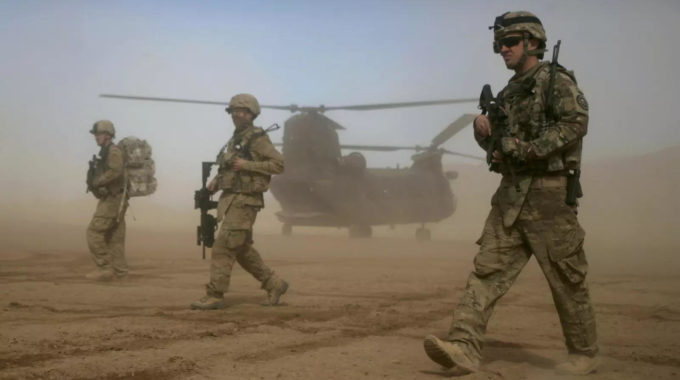Adapted from the writings of Dayan Yitzhak Grossman April 18, 2024 AP News reports: A…

Living Dangerously: Pikuach Nefesh in War
Adapted from the writings of Dayan Yitzhak Grossman
September 10, 2021
President Biden has faced widespread criticism[1] over his withdrawal from Afghanistan, much of it directed against the breaking of his commitment that “if there’s American citizens left, we’re going to stay until we get them all out,” even past August 31.[2] As the National Review put it:
[L]eaving Americans behind is a low point in the nation’s diplomatic and military history, and a rank failure of the most basic obligation of a government to take care of its own.[3]
A serious assessment of the Afghanistan withdrawal and its implementation is beyond the scope of this article, which will simply consider the basic question of the morality of military personnel risking their lives to save those of others.
Although many poskim rule that in general, it is wrong to risk one’s life to save someone else’s, R’ Eliezer Yehuda Waldenberg maintains that the rules of war are different, and a soldier is indeed permitted and even obligated to risk his life to save that of a comrade who lies wounded on the battlefield exposed to the enemy and will certainly die if he is not promptly removed. The ordinary rules prohibiting voluntary self-endangerment do not apply in war, because war inherently entails the risking of lives in the service of some objective. He adduces various precedents in support of this thesis that war is not governed by the standard rules of pikuach nefesh (preservation of life), including the following:
- R’ Meir Eisenstadter (the Maharam Ash), in justification of the permissibility of volunteering for military service (he is discussing volunteering to serve as a paid surrogate for a draftee) even in wartime, declares that this does not constitute suicide, for if it would, elective war would be prohibited by the commandment of “But you shall greatly beware [for your souls],” and Dovid Hamelech would not have so extensively engaged in elective war.[4]
- R’ Naftali Tvzi Yehuda Berlin (the Netziv) maintains that “The truth is that a king is permitted to go to war, even elective war, and he [need not be] concerned for the danger to life, since the danger of war is different from other dangers;”[5] “[A] Jewish king is permitted to engage in elective war even though many Jews will thereby be killed;”[6] “[A] king is not prohibited from engaging in elective war that entails danger to life…and similarly, there is no prohibition for an individual to participate in battle and to endanger himself.”[7]
The Netziv (followed by Rav Waldenberg) alludes to a remarkable source in the Gemara for this doctrine:
Shmuel says: A monarchy that kills one of every six individuals in the world is not punished for doing so, as that is the prerogative of a monarch, as it states: “My vineyard, which is mine, is before me; you, Shlomo, shall have the one thousand”—this is a reference to the monarchy of Heaven—“and two hundred for those who guard its fruit”[8]—this is a reference to the monarchy of Earth.[9]
Of the 1,200 mentioned in the pasuk, two hundred, or a sixth, are the prerogative of the earthly monarch. Tosafos explains that the legitimacy of killing one of every six individuals refers to engaging in elective war. Apparently, a kingdom’s—and perhaps any government’s—jurisdiction over its subjects extends even to the expenditure of their lives in the national interest! This point was already made by the Chasam Sofer, who suggests that this is actually the source of the principle of dina demalchusa dina (the law of the government is the law—i.e., recognized as valid by halacha):
[Shmuel’s statement] is not limited to killing, but it adopts the extreme case; even if [the king] needs to kill, e.g., for his wars, as Tosafos has explained there: Since this is necessary for the “guarding of the vineyard,” i.e., the national interest, it is entirely appropriate, and a fortiori [taking his subjects’] property, even in peacetime, for the sake of governance, is entirely appropriate…[10]
Rav Waldenberg subsequently cites an interpretation by R’ Dovid Pardo of a passage in the Sifri according to which a soldier is obligated to risk his life in order to save his fellow from death at the hands of the enemy. He concludes that the principle that chayecha kodmin (your life takes precedence) does not apply in the context of war, and that this is among “the halachos of the tzibur (public) for the benefit of the state and the good of the people.”[11]
It should be noted that Rav Waldenberg is discussing a soldier risking his life to save that of another soldier; it is unclear how this would apply to doing so to save a civilian. Rav Waldenberg’s arguments for allowing a soldier to risk his life apply equally to doing so in order to save civilians, but it is difficult to say whether Rav Waldenberg’s assumption that a soldier is obligated to risk his life would extend to saving civilians, since he never fully explains or justifies this assumption. Perhaps his responsibilities toward civilians are even greater than those toward his fellow soldiers, since they are noncombatants—or perhaps on the contrary, his responsibilities toward his fellow soldiers are greater, since they face the enemy and danger together in mutual reliance.
[1]Alexander Ward and Quint Forgey. ‘It’s unforgivable’: Lawmakers furious U.S. citizens stranded in Afghanistan. Politico. https://www.politico.com/newsletters/national-security-daily/2021/08/31/its-unforgivable-lawmakers-furious-us-citizens-stranded-in-afghanistan-494185.
[2]Myah Ward. Biden says U.S. will stay in Afghanistan until all Americans who want to leave can do so. Politico.
https://www.politico.com/news/2021/08/18/biden-says-us-will-stay-in-afghanistan-until-all-americans-allies-who-want-to-leave-can-do-so-506112
[3]The editors. National Review. https://www.nationalreview.com/2021/08/bidens-disgrace-2/.
[4]Shu”t Imrei Aish Y.D. siman 52.
[5]Meromei Sadeh Eruvin 45a, on Rashi s.v. Veha lo ba’u.
[6]Ha’amek Davar Bereishis 9:5 (and cf. Harchev Davar there).
[10]Shu”t Chasam Sofer C.M. siman 44 s.v. Vehinei ha deShmuel.
[11]Shu”t Tzitz Eliezer cheilek 12 siman 57 and cheilek 13 siman 100.





